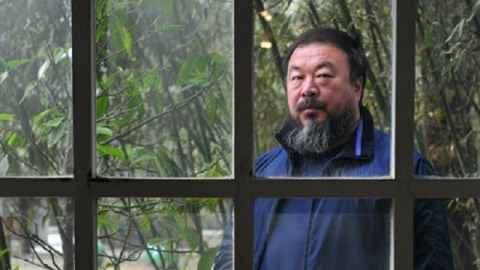Unacknowledged Legislators: Ai Weiwei and the Jasmine Revolution

“Poets are the unacknowledged legislators of the world,” wrote Percy Bysshe Shelley in “A Defense of Poetry” in 1821. A radical, Romantic humanist, Shelley passionately believed that artists of all stripes could inspire the masses to rise up against oppression. The “legislation” written and enacted by artists spoke directly to the yearnings of those seeking freedom. When the Chinese government seized artist Ai Weiwei (pictured above) yesterday as he tried to fly to Hong Kong from Beijing, they acknowledged the power of Ai’s art to “legislate” in a way they seemingly no longer could in the face of the oncoming “Jasmine Revolution.” The fate of Ai, and that of the Chinese people, now hangs in the balance.
Ai and the Chinese government have danced together before. 2008 remains an annus mirabulis for Ai. In that year, he uncovered an corruption scandal behind the construction of Sichuan schools that collapsed during the 2008 Sichuan earthquake that lead to a brutal beating that almost killed him. In that same year, Beijing National Stadium, aka, “the Bird’s Nest,” which Ai designed for the 2008 Summer Olympics in China, put a creative, open face on China’s repressive society for the world to see. Perhaps the Chinese government hoped to buy Ai’s cooperation with that plum commission. They guessed wrong.
Ai recently announced that he would open a 16,000 square foot studio in Berlin, Germany and would spend at least part of his time working there. Perhaps the Chinese government feared that Ai would lead protests from Germany, far outside of their control, and seized what may have been the last chance to control the artist, who has not been heard from since being taken into custody at an airport. After watching recent events in the Middle East, the Chinese government has taken even greater measures than usual to cut off all avenues for revolution from Facebook to modern art. Along with Ai, the Chinese government has seized several dozen intellectuals known for their political activism.
As Shelley pointed out, artists have always been on the front line of freedom. It will be interesting to see in real time how artists react to current events and create new art to address that brave new world. For example, Lebanese artist Rabih Mroue created new work in response to the recent revolutions in the Middle East, and even changed the title of his show from I, the Undersigned to The People Are Demanding. The United States government as well as the British and German governments have called for Ai Weiwei’s release. Through these statements, the people are demanding Ai be freed and allowed to “legislate” once more. At this point we can only pray that he’s still alive and well. Shelley’s “A Defense of Poetry” appeared 18 years after his death—too inflammatory to be printed while he breathed. Ai’s art may be too hot to handle for the Chinese government, but only by feeling heat from other countries is it possible that they’ll let him go.





